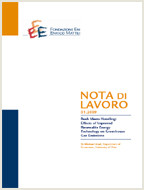Cross-Border Intellectual Property Rights: Contract Enforcement and Absorptive Capacity

15.03.2012
Alireza Naghavi, Yingyi Tsai
O34 , F13, F53, D78, L10, O33, C70
Intellectual Property Rights, TRIPS, Nash Bargaining, Contract Enforcement, Development, Absorptive Capacity, Monitoring
Economy and Society
Giuseppe Sammarco
This paper studies cross-border intellectual property rights (IPR) as a North-South contract using a Nash bargaining approach and distinguishes between the outcome and its actual enforcement. The absorptive capacity of the Southern country to exploit technology transfer plays a key role in the negotiated level of IPRs and its post-treaty enforcement. The optimal level of IPR protection relates positively to absorptive capacity. This provides a rationale for the longer time-frame provided to least developed countries in Article 66 of TRIPS to implement its provisions. In addition, monitoring is only effective in preventing contract violation up to a critical level of absorptive capacity. We relate this to the US Trade Representative “Special 301” report, which flags countries that deny adequate IPR protection as “priority watch list”. While disputes with less developed economies are promptly resolved, emerging economies, where most losses from copyright piracy originates from, continue to remain on the list.
